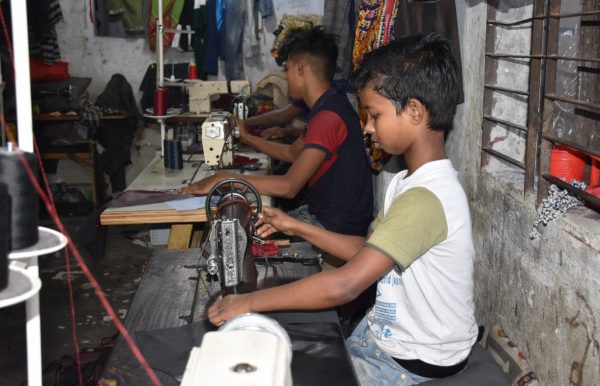Child labour prevailing in Bangladesh’s RMG sector: Study
- Update Time : Friday, February 7, 2025

TDS Desk:
A study conducted by the University of Nottingham’s Rights Lab and GoodWeave International highlights the risk of modern slavery and child labour in Bangladesh’s garment supply chains.
The ready-made garment (RMG) sector of Bangladesh employs over 40 lakh people, the majority of whom are women, and exports 80% of its production to Europe and the US, reads the report.
Though efforts are underway to improve conditions in the RMG sector there still prevails worker exploitation in hidden, subcontracted tiers of the supply chain linked to global export.
The Rights Lab (University of Nottingham) and GoodWeave International set out to document modern slavery and child labour risk in the RMG industry.
The research study collected data from surveys and focus group discussions with over 2,000 adult and minor workers across 20 industrial clusters in Dhaka and Chattogram, the country’s key RMG production hubs. The study revealed exploitative workplace practices, hazardous work for young workers, and low wages at exporter and subcontracted worksites, among other risks.
Key findings published in the new report, titled “Modern slavery and child labor in Bangladesh’s garment sector: documenting risks and informing solutions,” include:
1.Child labor is present in RMG export supply chains in Bangladesh, especially via subcontracted factories. 100% of the minors interviewed during the study were illegally employed as child laborers in RMG factories.
2.Thirty-two percent of adult RMG workers surveyed are being paid below minimum wage, and 7% of respondents’ income leaves them living below the international poverty line.
3.Almost a third of factory-based workers report working more than ten hours per day, six days per week, which exceeds the maximum limit for regular and overtime hours set by international and Bangladeshi law and is an indicator of forced labor.
4.While more women than men work in the RMG sector, they earn on average Tk2,000 ($18) less per month than their male counterparts.
5.Fifty-six percent of factory workers surveyed have experienced threats or abuse at their current job—68% of adult workers and 90% of minors who reported abuse were female.
The report provides concrete recommendations for the Bangladeshi government, international buyers, local garment suppliers and non-governmental organisations and trade unions to improve supply chain transparency, conduct risk-based human rights due diligence, adequately compensate workers, mitigate child and forced labor, and establish effective grievance mechanisms.
“Our extensive research on modern slavery in supply chains shows that manufacturing is one of the high-risk industries for forced labour. We are pleased to work with GoodWeave and Bangladesh Labor Foundation on this new research to understand the scale and nature of exploitation in garment production and identify the critical areas where change can help to ensure decent work conditions,” said Zoe Trodd, director of The Rights Lab.
Jon Jacoby, CEO at GoodWeave International, said, “This report by GoodWeave and The Rights Lab highlights persistent risks of exploitation in the hidden tiers of Bangladesh’s garment supply chain while proposing systemic and scaled solutions.
“By joining forces for more effective due diligence, brands, suppliers, governments, trade unions, and civil society can protect the rights and dignity of vulnerable workers and children while supporting the sustainable growth of this crucial industry for Bangladesh. Let’s roll up sleeves and take the high road—together.”















